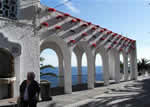
A church tower standing tall; local bars open for orders; intimate shops; gossiping neighbours in geranium lined streets, a bustling post office and a busy school. These elements form our image of the quaint Andalucian Pueblo Blanco. But is this becoming more picture postcard fantasy than everyday reality of where we live? Look a little more closely and already there are visible signs that life is altering. Former shop signs remain intact, but the buildings beneath are boarded up and no-one is queuing up to take over where the previous owners left off. The closure of shops and services in small towns and villages will destroy community life & villages will start to lose some of the key ingredients that contribute to their character. You'd need to drive miles for a decent meal or to buy a paper. A world dominated by big name chain stores is a world without communities. Do we really want all of our towns to look the same?
Unless the community takes firm action to stem the slide, village life is under threat. Failing to support local traders could once again bring the spectre of ghost towns.It seems obvious that we do business where we feel we receive the best value for our time and money. Perceptions, however, are not always accurate we see and hear the ubiquitous ads of corporate chains everyday, but are rarely informed about the many important values independent businesses provide us individually and as a community. So why should we shop locally
Top Ten reasons to
Think Local – Buy Local – Be Local
1. Buy Local — Support yourself: Several studies have shown that when you buy from an independent, locally owned business, rather than a nationally owned business, significantly more of your money is used to make purchases from other local businesses, continuing to strengthen the economic base of the community.
2. Support community groups: Local charities receive an average 250% more support from smaller business owners than they do from large businesses
3. Keep your community unique: Where we shop, where we eat and have fun – all of it makes our
community home. Our one-of-a-kind businesses are an integral part of the distinctive character of this place.
4. Create more good jobs: Small local businesses are the largest employer nationally and in our community, they provide the most jobs to residents.
5. Get better service: Local businesses typically work harder for you. When was the last time that you asked McDonalds to knock you up something that wasn't on the menu or you phoned Mercadona on a Sunday to ask if you could nip round & pick up some tea bags.
6. Invest in community: Local businesses are owned by people who live in this community, are less likely to leave, and are more invested in the community's future.
7.Put your taxes to good use: Local businesses in town centers require comparatively little infrastructure investment and make more efficient use of public services as compared to out of town chain stores.
8. Buy what you want, not what someone wants you to buy: A multitude of small businesses, each selecting products based not on a national sales plan but on the needs of their local customers, guarantees a much broader range of product choices over the long-term
9. Encourage local prosperity: when businesses start to flow out of an area due to an economic downturn house prices start to fall. The amount of Spanish families' wealth tied up in property in 2004 amounted to 4.3 trillion euros; defaults on Spanish home loans in the last quarter of 2008 were the highest in at least four years, according to the Spanish RMBS delinquency index.
10. Use them or lose them: When asked to name our favorite restaurant, cafe, or shop, we almost always cite a unique local business (look at the results in any "Best of" polls as proof). We embrace the idea of distinctive businesses with local character, but often forget their survival depends on our patronage.
If we value our lifestyle we need to consciously plan a future that encourages the values we want reflected in our communities. And each time we spend a euro, we need to consider the value of our choices, not solely to ourselves immediately, but for the future we want in our own home towns.



















